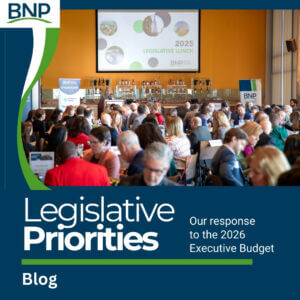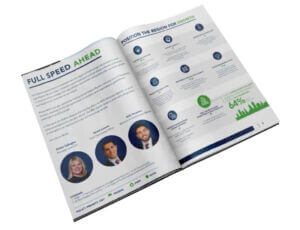What Employers Need to Know About the HERO Act
Blog Categories
May 24, 2021
Recently, Governor Cuomo signed the NY HERO Act, a bill that creates new workplace safety requirements. This legislation will have wide-ranging implications for employers across the state. The BNP strongly advocated for changes to make this legislation less burdensome. Now that it has become law, it is important for employers to understand how the HERO Act will impact them.

What Does it Do?
- Airborne Infectious Disease Exposure Prevention Standards. The bill requires the state Departments of Labor and Health to develop new workplace disease prevention standards, governing:
- health screening
- masks and PPE
- handwashing
- surface disinfecting
- social distancing
- quarantines and isolation
The state will publish industry-specific guidelines. Then, every employer is required to create a workplace safety plan by adopting the state model for their industry or by creating their own standard that meets the state’s minimum requirements. Employers will then be required to adhere to these plans at all times – even after the pandemic ends. Noncompliance will be costly: the state will fine employers $50/day for failure to adopt a safety plan. Employers who violate their safety plan can be liable for fines between $1,000-$10,000. This provision is expected to take effect July 4th.
- Workplace Safety Committees. The bill requires every workplace with 10+ employees to form a workplace safety committee. The committee must meet quarterly and be composed of employer and employee designees. These committees are tasked with raising health and safety concerns to their employer, to which employers. must respond. This requirement takes effect November 1st.
What action did BNP take?
The BNP was active in pushing back against this legislation after hearing concerns from numerous members. Throughout the pandemic, businesses have shown an ability to follow rapidly-changing public health guidelines and adjust their operations in real time, and the state’s own data has shown a very small amount of COVID-19 transmissions at workplaces. Instead of acknowledging businesses’ ability to protect employees, this bill adds duplicative and costly requirements onto them. The BNP remained in frequent contact with the Governor and legislative leaders to express concerns with this bill and to suggest improvements that would make it less burdensome without reducing protections for workers.
For what amendments did BNP advocate? Were those amendments included in the final agreement?
- Limit the infectious disease standards to declared states of emergency. BNP argued that doing so would protect workers in times of crisis, while reducing the burden on businesses when risk is low. This proposed amendment faced the most resistance and was not included in the final agreement.
- Eliminate private right of action. BNP argued that the private right of action would subject employers to significant liability and frivolous lawsuits. This provision was not fully removed in final agreement, but some important chapter amendments will improve it:
- Employers are no longer liable for liquidated damages
- Employees are required to notify employers of issues
- 30-day cure period in which employers can correct violations without penalty
- 6-month statute of limitations
- Courts can award employers for costs and attorney fees in frivolous lawsuits
- Eliminate workplace safety committees. BNP argued that the bill’s workplace safety committee structure is burdensome and costly, and there are better ways to include employee input. Although the enacted law still mandates these committees, the final agreement includes minor chapter amendments. Employers that already have existing workplace committees are exempt from this provision. The scope of policies the committee can review is much more narrow in the final agreement: the original bill would have allowed the committee to review any policy related to worker’s compensation law, but the agreement limits the committee’s scope to reviewing occupational safety policy.
The full HERO Act text can be found here, and the agreement’s chapter amendments here. As the state releases its standards as required under the Act, BNP will continue to communicate updates and helpful information.
Related Posts
CEOs Speak: A cautious rise in optimism
At our recent CEOs Speak event—the only forum in Buffalo Niagara showcasing the results from the annual Upstate New York Business Leader Survey—local leaders delivered a powerful message: optimism is cautiously rising, but government intervention remains a persistent obstacle to regional economic growth.
Legislative priorities: BNP’s reaction to the Executive Budget
On February 14, we set the stage for critical discussions about the future of New York State’s economy by convening regional business leaders and policymakers, along with BNP members, at the 1970 Club in KeyBank Center for our Legislative Luncheon.
2025 Advocacy Agenda: Shaping the future
On Jan 9, our signature Government Affairs event unveiled the strategies and priorities that will guide our work this year with policymakers.
Expert panel talks collaboration as key to tech hub future
Buffalo Niagara Partnership President & CEO Dottie Gallagher was a recent guest on M&T Bank’s CommunityLIVE to discuss the tech hub and what it means for the region moving forward.




